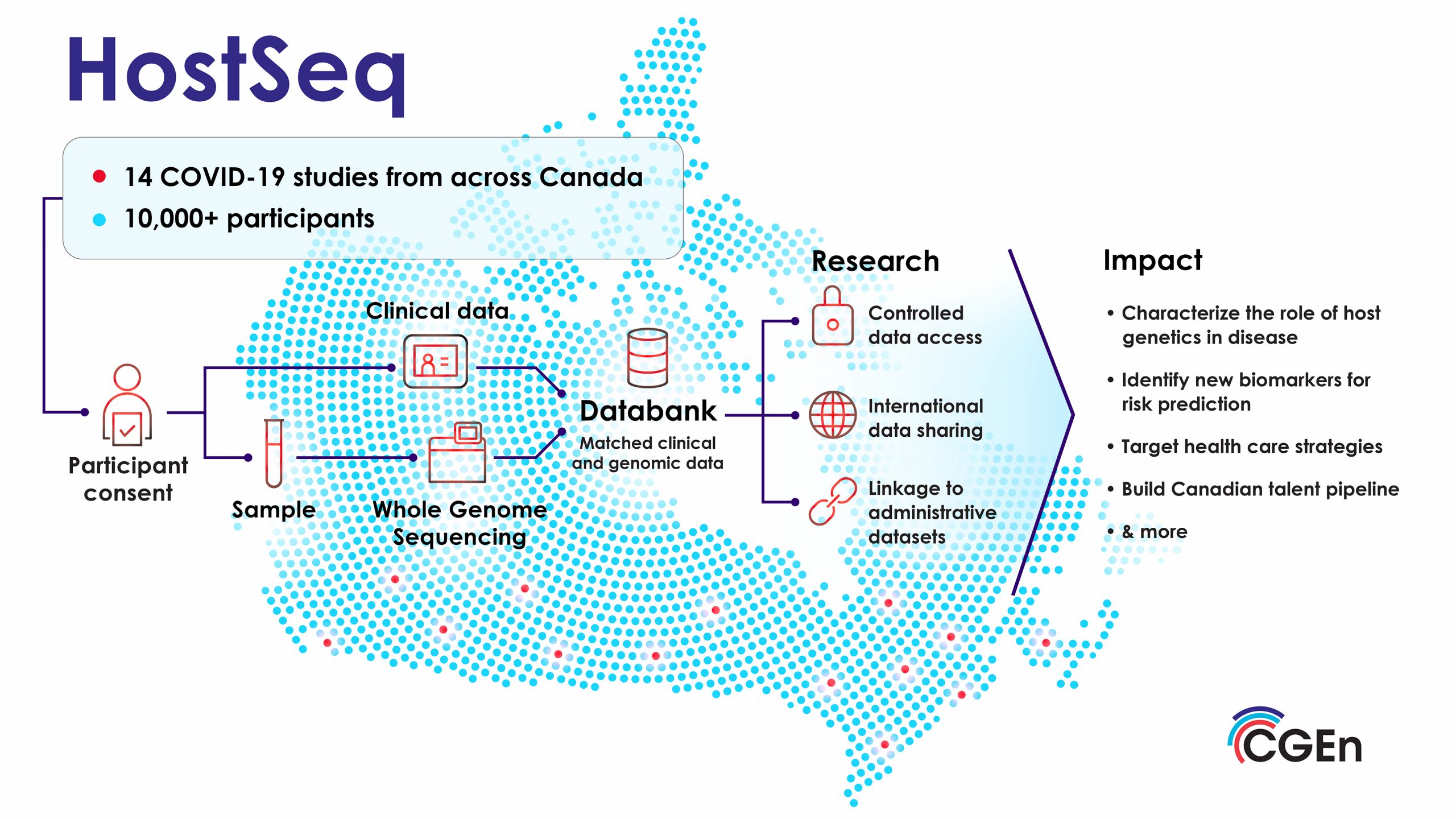DNA Day: CGEn Celebrates 10,000 Human Genomes in the Canadian HostSeq Databank
April 25, 2022 – CGEn, Canada’s national platform for genome sequencing and analysis, and its partners are marking World DNA Day by celebrating Canada’s landmark human genome sequencing initiative called HostSeq. Led by CGEn, the HostSeq databank will include the whole genomes (the full set of DNA) of 10,000 Canadians (“Hosts”) with the aim to help understand the genomic architecture of the host response to COVID-19. The HostSeq databank also includes linked standardized clinical information collected at multiple clinical sites across Canada over the past two years of the pandemic.
“The need for a national genomics databank grew very quickly early on in the pandemic. As soon as we started to observe differences of disease manifestation and symptoms in people infected with SARS-CoV-2 virus, we realized that there was an urgent need to collect and analyze population-wide host genetic data,” explains Dr. Naveed Aziz, Chair of the HostSeq Implementation Committee and Chief Executive Officer, CGEn. “The Government of Canada’s prior investment in CGEn allowed us to deploy our capacity to sequence genetic information of Canadians who were experiencing vastly different health outcomes in response to infection by the virus.”
The national HostSeq initiative, funded by the Federal government through Genome Canada’s Canadian COVID-19 Genomics Network (CanCOGeN), is accessible to Canadian and international researchers to help study the health outcomes of those affected by the virus and to identify the genetic contributors of disease severity. This first-of-its-kind Canadian genomics databank may help to better diagnose and treat those predisposed to severe illness, backed by their genomic data.
Owing to a concerted effort led by CGEn and its team, 14 clinical and research studies across the country were brought together to contribute to the databank that includes 10,000 study participants who have consented to the use of their genomic and clinical data for future research. The HostSeq databank will not only help to answer current research questions related to the virus, but will also serve as a resource when responding to future infections and preparing for future pandemics.
“We are thrilled to have a population-based whole genome sequencing effort in Canada,” says Dr. Lisa Strug, Director of the University of Toronto’s Data Sciences Institute and the Ontario regional Centre of the Canadian Statistical Sciences Institute; Senior Scientist, Genetics and Genome Biology, and Associate Director, The Centre for Applied Genomics, The Hospital for Sick Children (SickKids). “Many countries have whole genome sequencing cohorts that they have made available and have had an important impact in health research broadly. The HostSeq databank will provide the Canadian perspective, and reflect data from individuals living in Canada,” says Strug, who is part of the HostSeq Implementation Committee and Chair of the Genetic Epidemiology Committee.

The HostSeq databank gives Canadian scientists access to a rich dataset to help analyze and identify genetic determinants of susceptibility, severity and outcomes of COVID-19. It will also enable researchers to investigate population-level risks for many other diseases, including the potential to deliver new biomarkers that support prediction of risk, and novel therapeutic strategies.
This DNA Day, there are countless scientific advancements to celebrate, and Canadians can count the HostSeq databank as a major step in how important population-level data can be collected and shared to help advance research and health care in Canada.
“The delivery of the HostSeq project would not have been possible without the effort and commitment of its Implementation Committee, whose tireless efforts since the beginning of the project has allowed CGEn to play a key role in Canada’s response to the COVID-19 pandemic. The HostSeq project has proven that large-scale genomics is a present reality in Canada. The time is now for all partners and stakeholders to come together and build on the years of investment and effort towards a Canadian ecosystem where research is enabled by large datasets,” says Aziz.
Linked Resources
HostSeq: A Canadian Whole Genome Sequencing and Clinical Data Resource by Dr. Lisa Strug et. al.
Read about the importance of Big Data in enabling data-driven Canadian research and discovery in Dr. Naveed Aziz’s latest blog post.
To apply for HostSeq data access, please visit the CGEn website.
About CGEn
CGEn is a federally funded national platform for genome sequencing and analysis. Established in 2014, CGEn employs over 200 staff, and is funded primarily by the Canada Foundation for Innovation (CFI) through its Major Science Initiatives Fund (MSI), leveraging investments from Genome Canada and other stakeholders. CGEn operates as an integrated national platform with nodes in Toronto (The Centre for Applied Genomics at The Hospital for Sick Children), Montréal, (McGill Genome Centre at McGill University) and Vancouver (Canada’s Michael Smith Genome Sciences Centre), providing genomic services, including genome sequencing and analysis, that enable research in agriculture, forestry, fishery, the environment, health sciences, and many other disciplines of interest to Canadians.

